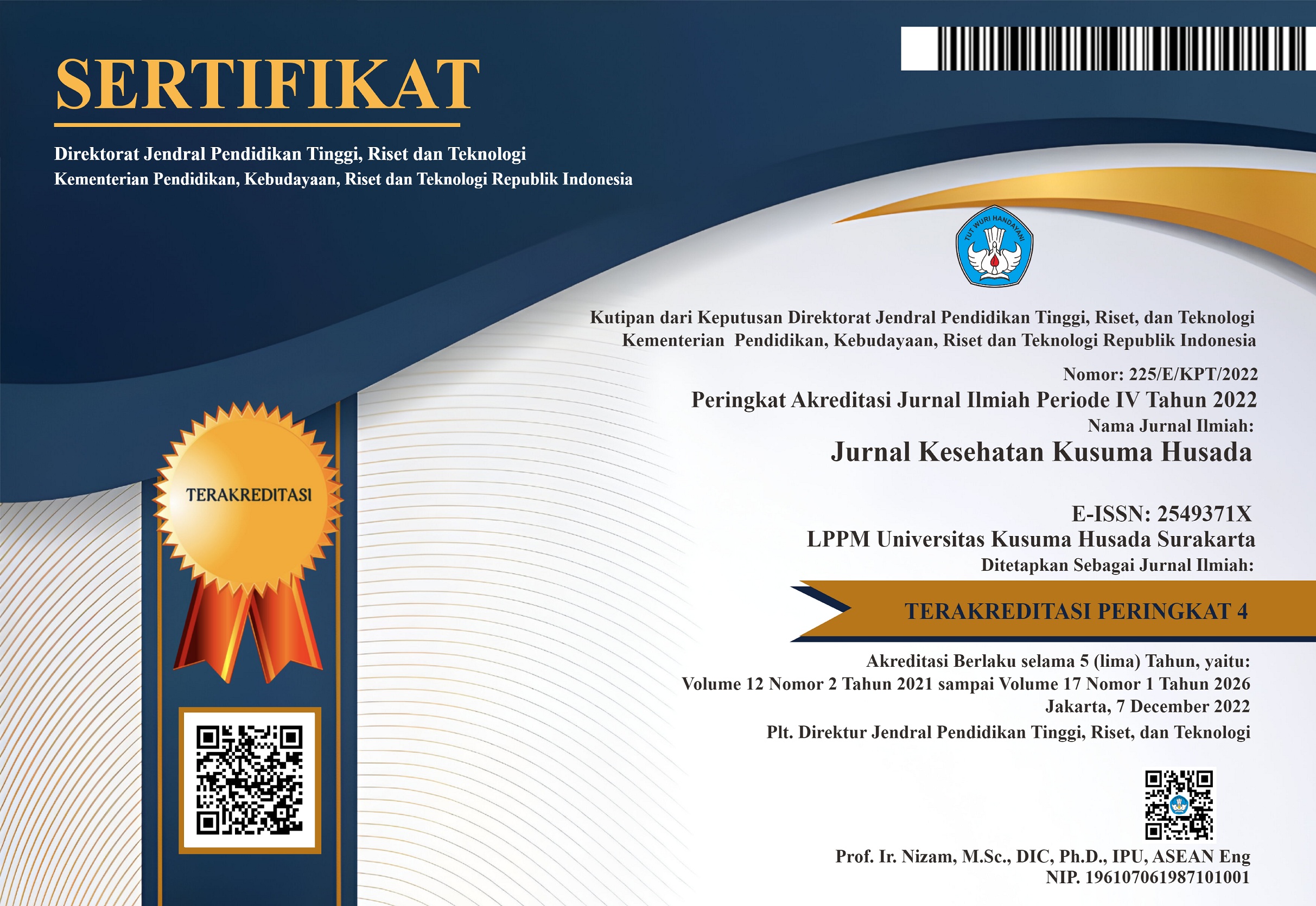E-HEALTH NURSING VIRTUAL REALITY TREND PADA PASIEN SKIZOFRENIA GUNA MENINGKATKAN KESEHATAN MENTAL: SYSTEMATIC REVIEW
DOI:
https://doi.org/10.34035/jk.v12i2.728Keywords:
e-health nursing, skizofrenia, virtual reality, VR, Hallucination, SchizophreniaAbstract
permasalahan serius di dunia dan Indonesia. Data dari World Health Organization sekitar 21 juta orang mengalami skizofrenia. Prevalensi skizofrenia di Indonesia mengalami peningkatan proporsi per 1000 penduduk (1,7%) pada tahun 2013 menjadi (7%) pada tahun 2018. Faktanya terapi keperawatan untuk halusinasi belum optimal sedangkan teknologi terus berkembang seperti Virtual Reality (VR). VR mampu menurunkan gejala pada skizofrenia dengan kemampuan membuat perilaku interaktif dan tersimpan dalam otak agar tidak menimbulkan halusinasi. Teknologi ini digunakan untuk mengetahui manfaat E-Health Nursing VR sebagai terapi halusinasi pada pasien skizofrenia. Metode penelitian menggunakan systematic review dari 5 database yaitu Nature, Frontiers, BMC, Science Direct, NEJM sehingga didapat total 55 literatur. Mayoritas 63% mengulas terapi VR untuk mengurangi halusinasi pada skizofrenia. Perkembangan manfaat VR diverifikasi dalam beberapa pengobatan: skizofrenia, PTSD, kecemasan, akrofobia, ganguan citra tubuh, claustrophobia, dan lain-lain. Beberapa studi skizofrenia menyatakan terapi VR sangat efektif menangani delusi, halusinasi, gejala kepribadian skizoid. VR juga berguna dalam rehabilitas kognitif pada orang dewasa atau anak-anak autis dalam keterampilan dan kemandirian. Kesimpulan penelitian ini adalah VR terbukti efektif sebagai terapi kesehatan jiwa di masa mendatang. Disisi lain terdapat terapi psikologis pilihan seperti terapi perilaku kognitif, dan psikoterapi interpersonal. Oleh karenanya diperlukan kombinasi terapi VR dengan terapi komplementer tersebut dalam mengurangi halusinasi pada skizofrenia.
Mental health become a severe problem in the world and Indonesia. Data from the World Health Organization (WHO, 2016) estimated that 21 million people have schizophrenia. The prevalence of schizophrenia in Indonesia has increased proportion per 1000 population (1,7%) in 2013 to (7%) in 2018. In fact of nursing, therapy for hallucination is not optimal while constantly evolving technology such as Virtual Reality (VR). VR can reduce symptoms in schizophrenia with the ability to create interactive behavior and stored in the brain in order to cause hallucinations. The objective of this study was to review the benefit of VR as a hallucination therapy in schizophrenia patients. This research used a systematic literature review from five databases Nature, Frontiers, BMC, Science Direct, NEJM, and resulted in the retrieval of 55 papers. The majority of a result found a 63% review in Virtual Reality therapy can reduce hallucination in schizophrenia. VR is a technology browser and manipulator sensory environment in real-time 3D. The progressing benefit of VR verified in the treatment of schizophrenia, PSTD, anxiety, acrophobia, body image disorder, claustrophobia, and others. Some studies of schizophrenia declare that virtual reality therapy is effective in treating delusions, hallucinations, and a symptom of schizoid behavior. VR also has benefits in cognitive rehabilitation in adults or children with autism's inability and self-reliance. VR has a bright future as the treatment of mental health. The progressing of technology and research has an excellent opportunity for VR to reduce schizophrenia. Moreover, there is psychological therapy, such as cognitive-behavioral therapy and interpersonal psychotherapy. Therefore a combination needed of virtual therapy with the complementary therapy for reducing hallucination in schizophrenia.
References
Downloads
Published
Issue
Section
License
Copyright (c) 2021 Jurnal Kesehatan Kusuma Husada

This work is licensed under a Creative Commons Attribution 4.0 International License.
The copyright of the published articles belongs to Jurnal Kesehatan Kusuma Husada.

This work is licensed under a Creative Commons Attribution 4.0 International License.
















